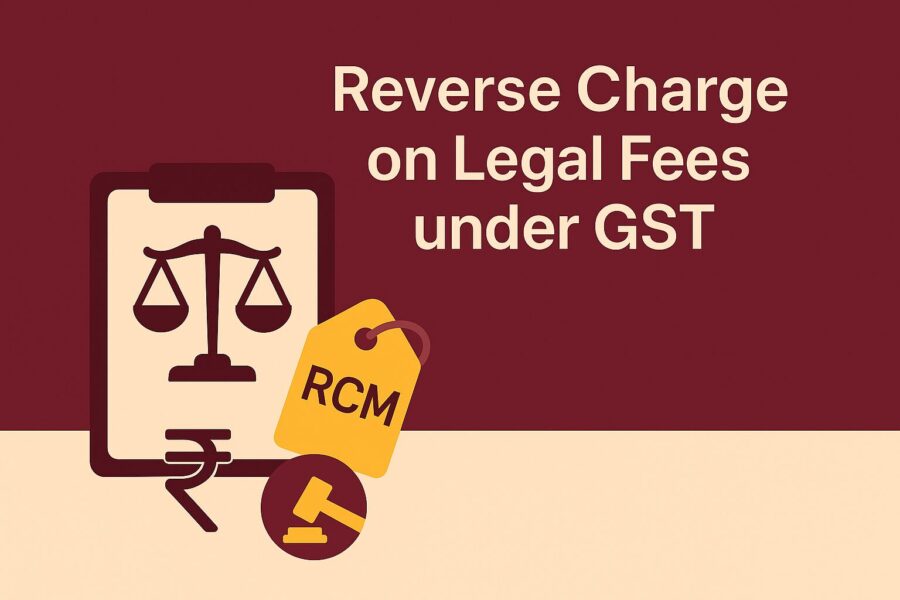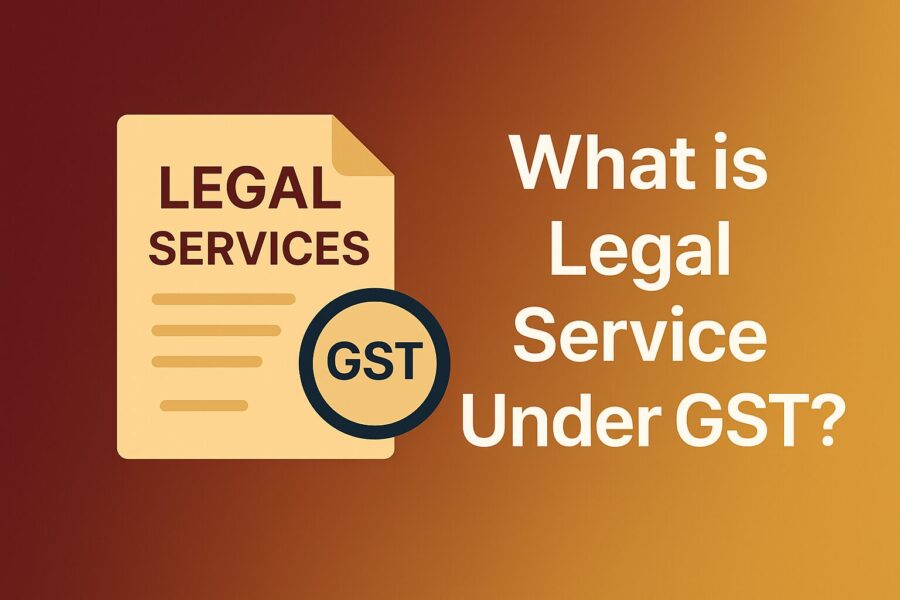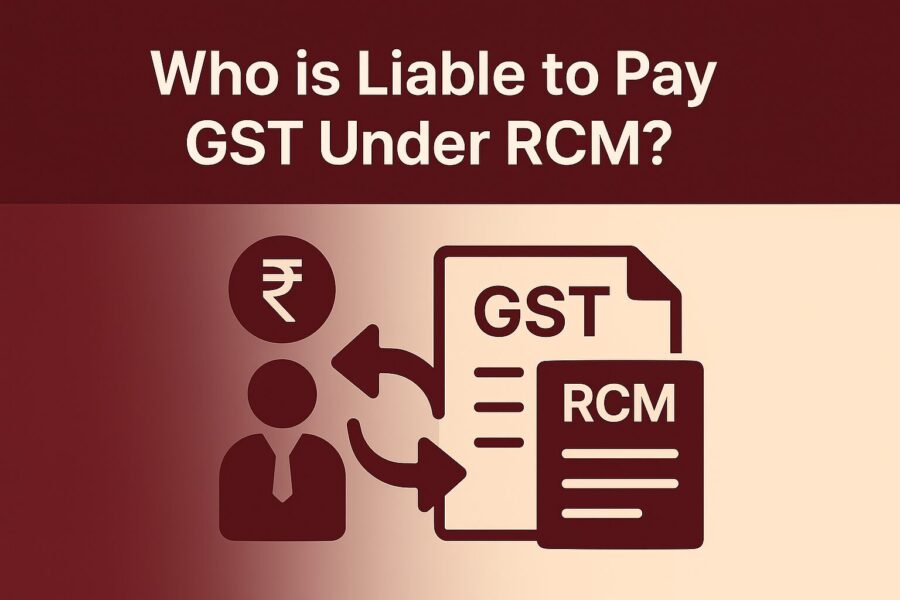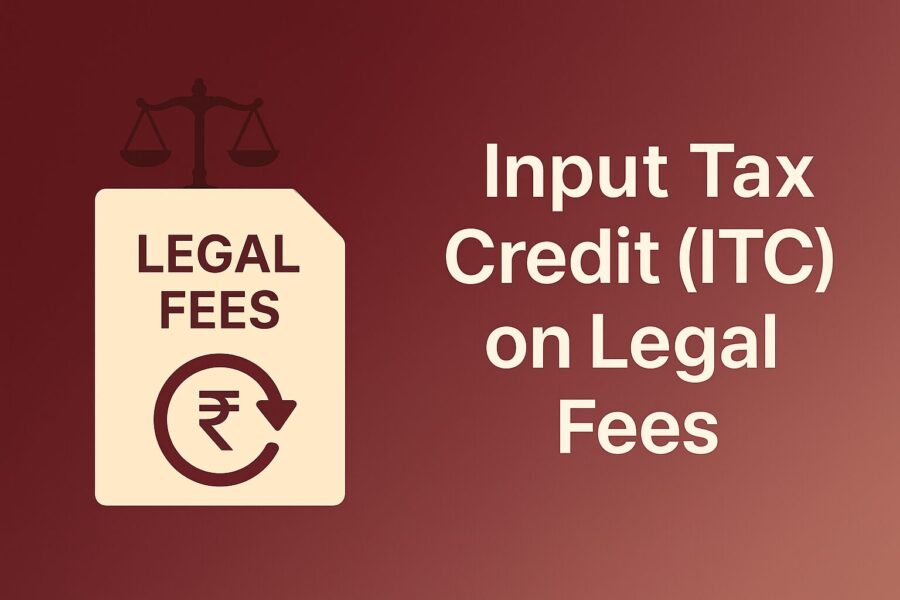Reverse Charge on Legal Fees under GST
- 28 Oct 25
- 11 mins

Reverse Charge on Legal Fees under GST
Key Takeaways
- Legal services under GST attract 18% tax, payable by the recipient under the Reverse Charge Mechanism (RCM) as per Notification No. 13/2017.
- RCM on legal fees applies when services are provided by advocates or law firms to registered business entities or government bodies.
- Advocates providing services covered under RCM are exempt from GST registration, while recipients must register and pay GST directly.
- Registered businesses can claim Input Tax Credit (ITC) on GST paid under RCM for legal services used in business operations.
- Taxability of reimbursements by advocates depends on whether expenses qualify as ‘Pure Agent’ transactions under GST law.
The Indian legal services market is predicted to grow at a CAGR of 9-10% and reach USD 2.49 billion crore by 2025. As the GST regime covers a wide range of goods and services, legal services are no exception. Note that RCM extends special provisions which state the GST on legal services.
Are you a law firm/business owner wondering if you are liable to pay GST on legal fees? Knowledge about the same is crucial against the backdrop of an ever-expanding Indian legal services market.
Let’s dive into how the reverse charge on legal fees under GST applies.
What is Legal Service Under GST?

Before discussing the taxability of legal services, it's important to understand what legal services imply. “Legal services” is a phrase which constitutes various activities which are performed by lawyers (including senior advocates, firm of advocates, individual advocates and partnership firms). The phrase may include the following:
● Advice giving
● Consultancy work
● Representational services before courts
Such acts are categorised under the SAC Code 9982. This code comprises legal and accounting services against the respective HSN code for 998213 legal being.
Refer to the table below for the HSN code, SAC code and applicable GST Rates:
| Service Type | SAC Code | HSN Code | GST Rate |
| Legal Consultancy & Advisory Services | 9982 | 998213 | 18% |
| Advocates-led Representation in Courts | 9982 | 998213 | 18% |
| Legal Documents Drafting | 9982 | 998213 | 18% |
To understand the meaning of “legal services” in the context of Goods and Services Tax, it is also important for you to have an idea regarding RCM. The Reverse Charge Mechanism, abbreviated as RCM, is a provision falling under the GST system in India.
Within the general GST scenario, a supplier shall levy GST on the recipient. The former shall proceed to deposit the same with the government.
However, in the case of RCM, a recipient shall go for GST registration and pay the applicable GST on the concerned goods/services directly to the government. It will not be extended to the supplier. RCM usually applies in the case of specific goods/services or in the case where supplies are from unregistered suppliers.
Legal Services Registration Under GST
18% GST is applicable on legal services under RCM. Within this context, the tax structure comprises one of the following:
● Central GST (CGST)/State GST (SGST) for intra-state transactions
● Integrated GST (IGST) for inter-state transactions
Note that the recipient of the service shall be responsible for keeping account of and remitting the right amount of GST. This will be in the place of supply.
If legal practitioners extend services which are grouped under RCM, they are exempted from the need to register under GST. If such an individual receives the services, they become liable to comply with payment requirements, concerned with the goods and services tax.
If a legal practitioner extends ‘non-business entities’ certain services/takes part in taxable activities (not described within the context of RCM), they shall be mandated to register themselves under the GST system in India.
How Does GST Apply to Legal Services Under RCM?
Notification No 13/2017 details the applicability of GST on various legal services under RCM. As per the official notification, any legal service extended by an advocate/firm of advocates to a certain business body will attract GST under RCM. The provision became effective on July 1, 2017.
This is applicable to every registered business body.
Who is Liable to Pay GST Under RCM?

GST payment obligation in the context of the provision of legal services does not solely rest on the service provider. Rather, it falls onto the individual on the receiving end. Refer to the table below for a better understanding:
| Service Provider | Recipient of Service | Applicability of GST | GST Paid By | Whether or Not RCM is Applicable |
| Individual Advocate | Registered Business Entity | 18% (CGST + SGST/IGST) | Recipient Business Entity | Yes |
| Law Firm | Registered Business Entity | 18% (CGST + SGST/IGST) | Recipient Business Entity | Yes |
| Individual Advocate | Non-Business Entity or Individual Consumer | Exempt | Not Applicable | No |
| Advocate (Inter-State Service) | Registered Business Entity | 18% IGST | Recipient Business Entity | Yes |
| Advocate | Government Body or PSU | 18% (CGST + SGST/IGST) | Government Body or PSU | Yes |
What Are the Duties of the RCM Recipient?
There are specific obligations of the RCM recipient for compliance. The following is expected from the legal services recipient under RCM:
● Registration under GST: In order to discharge tax liability under RCM, the recipient is required to be registered under GST in India.
● Time of Supply: Based on whichever is earlier, at the time of payment/receipt, services which come under RCM are taxable.
● GSTR-3B Filing: The GSTR-3B is a monthly return that needs to be submitted by the recipient. It has an associated tax liability and a condition for timely GST payment.
● Claiming of Input Tax Credit (ITC): The recipient shall claim ITC upon paying off the GST amount; this is subject to eligibility.
Time of Supply in Case of Services Under Reverse Charge
The "Time of Supply" is the point when the supply is liable to GST charges. Certain factors determine the time of supply.
One such relevant factor determining the same is the individual who is liable to make the tax payment. In the context of reverse charge, the recipient shall be liable to pay GST. So, the time of supply for supplies that come under reverse charge is separate from the supplies of other nature.
Within the context of the supply of goods, the time of supply is soonest for:
● The date of receipt of items; or
● The date of the payment according to the books of account/debit date in the bank account (whichever is earlier); or
● The date which immediately follows 30 days from the issue date of the invoice/other similar document.
For the supply of services scenario, the time of supply is earliest for:
● Payment date according to the books of account/debit date in the bank account (whichever comes sooner); or
● The date which immediately follows 30 days from the issue date of the invoice/other similar document.
In case it is not possible to determine the time of supply through the above-mentioned methods, the entry date as per the books of account of the respective recipient shall be considered as the time of supply.
Input Tax Credit (ITC) on Legal Fees

Say, an individual pays GST on legal services. They may be able to claim it as the input tax credit (ITC), under the condition that the services are implemented in their business. Note that a few other conditions, as per Section 16 of the CGST Act, are also applicable and must be complied with.
Note that ‘blocked credits’, which come under Section 17(5), shall not be claimed. This includes those expenses as well, which are personal expenses (they do not qualify).
According to Notification No. 5/2017 – the Central Tax dated 19th June 2017, the requirement for registration is exempt, given that the supplies are fully covered under the Reverse Charge Mechanism (RCM). But if the advocate/advocate firm has either of the following:
● Another taxable income source
● If an aggregate turnover exceeds ₹20 lakh, the entity shall be required to register under GST. Note that for the calculation of the ₹20 lakh limit, every sort of supply which is exempt, taxable, up for export, interstate, RCM output or Nil-rated is to be clubbed into one.
Here are the requirements when it comes to claiming ITC:
● Any necessary proofs, including payment vouchers and invoices. These must be kept handy by the recipient, who must present proof of GST being paid on an RCM basis.
● The ITC claims need to be made within particular deadlines as prescribed under the applicable GST law, typically within a single financial year itself.
Tax on Reimbursement Expenses Charged by the Advocates
Taxability of reimbursement on expenses shall ultimately depend on the nature of expenses as accumulated by advocates for the provision of services. In case such kinds of expenses are in the nature of ‘Pure Agent’ than of ‘tax’, they do not have to be paid. Otherwise, they may be taxable.
Consider the following example: an advocate has paid legal fees to the Government on behalf of a client. They charge clients the actuals. In this case, GST shall not be paid by the client as all the conditions of Pure Agent are fulfilled. Under the same scenario, if a markup in expenses is noted, GST needs to be paid. In the case of expenses apart from those which are of a pure agent nature, GST must be paid.
Conclusion
The process of taxation of legal services, especially via the reverse charge mechanism, is responsible for adding another layer of complexity to both the providers’ and recipients’ experience with compliance.
If the legal service type is grouped under the RCM scope, legal practitioners are usually exempted from the requirement to register under GST and comply. This shifts the burden onto recipients to a great degree.
Business entities are required to ensure that they comply with all the registration-related requirements for overall tax payment purposes. This shall also simply report during the process of sourcing for legal services. Stay compliant by keeping up with the latest information regarding reverse charges on legal fees under GST, which continues to evolve.
💡If you want to streamline your payment and make GST payments via credit, debit card or UPI, consider using the PICE App. Explore the PICE App today and take your business to new heights.



















